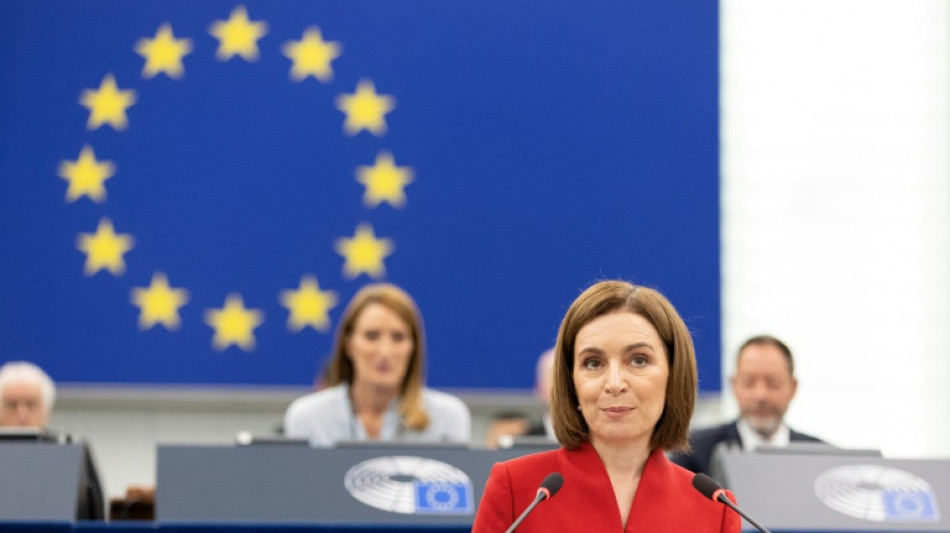
Russia-linked disinfo campaign targets Moldovan election

Ahead of Moldova's parliamentary elections on Sunday, deepfake videos and unsubstantiated accusations targeting pro-EU President Maia Sandu are spreading online, with analysts warning the country has become Moscow's "testing ground" for information warfare in Europe.
The vote is seen as crucial in deciding whether the EU candidate country of some 2.5 million people will deepen its ties with the bloc or drift back towards Moscow, from which it gained independence in 1991.
Most polls so far suggest that Sandu's pro-EU party, in power since 2021, is in the lead, but it faces a tough challenge from the opposition.
Sandu has warned of "unprecedented interference" by the Kremlin, accusing it of "pouring hundreds of millions of euros" to buy votes and targeting voters with disinformation.
Weeks before the polls, Sandu became the subject of a mocking, deepfake video –- created with Luma AI –- of her performing a rap song in Russian that portrays her as an ineffective leader.
It was just one type of misleading content spread by the Russian-aligned disinformation campaign known as Operation Overload or Matryoshka (Russian doll), according to the online collective Antibot4Navalny.
Other unsubstantiated accusations levelled at Sandu include that she suffers from schizophrenia and that her party has "rigged" the election.
On Telegram, among the claims spread in Russian is that European leaders want to use Sandu –- an ally of Ukrainian President Volodymyr Zelensky –- to start a war in Moldova, and impose a dictatorship before mobilising Moldovans to fight in neighbouring Ukraine.
- Fake accounts -
Several investigations have all found Russia-linked disinformation campaigns.
Antibot4Navalny shared extensive evidence with AFP of disinformation being propagated by Kremlin-aligned Telegram channels before being spread by influencers-for-hire on TikTok and bot-like accounts on X.
Some of the English-language X posts impersonated foreign media organisations such as AFP and the BBC, seemingly targeting international audiences, including the more than one million Moldovans living abroad.
Meanwhile the BBC this week published its findings about a secret Russia-funded network attempting to disrupt the election.
The network, linked to fugitive pro-Russian politician Ilan Shor, allegedly paid Moldovans to share pro-Russian propaganda, resulting in fake posts that were viewed millions of times, the BBC found.
Separately, Moldovan newspaper Ziarul de Garda revealed earlier this month that a group linked to Shor coordinated hundreds of activities through secret Telegram groups to flood TikTok and Facebook with anti-European Union propaganda.
The activists were trained online by Russian-speaking curators for several months in a row, the investigation found, and some were later recruited as paid trolls by Moscow.
Researchers believe the revelations are just a snapshot of Moscow's wider coordinated network targeting Moldova and ultimately, Europe.
"Unfortunately, Moldova has become a testing ground for Kremlin information warfare in Eastern Europe," said Nicolae Tibrigan, research scientist at the Romanian Academy in Bucharest.
- 'Eroding confidence' -
Experts say such Russian disinformation campaigns targeting elections –- also exposed in neighbouring EU and NATO member Romania –- are ultimately designed to push Moldova back towards Moscow and destabilise the European Union.
"The objective is not just to manipulate a few votes, but to erode confidence in the democratic process," said Corneliu Bjola, professor of Digital Diplomacy at the University of Oxford.
A Meta spokesperson said the tech giant was "continuing to monitor the situation".
"We have previously disrupted the vast majority of the inauthentic activity identified in these reports," the spokesperson said in an email sent to AFP.
According to TikTok, it has removed content and accounts that violate its guidelines, including a network of at least 6,790 accounts attempting to discredit the current Moldovan government.
Russia will continue to target other European democracies with similar disinformation campaigns if its tactics succeed in Moldova, analysts say.
"Europe, with Romania on the frontline, is the ultimate target," Bjola, the Oxford professor said.
L.Johnson--TNT